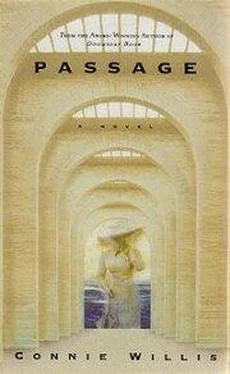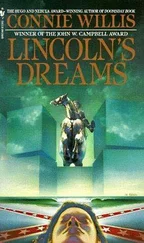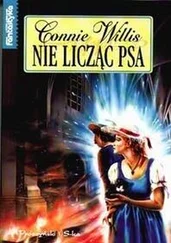“No one who hasn’t experienced it could possibly understand,” Mrs. Kelly had said haughtily. “It would be like trying to explain light to a blind man,” but Joanna could still remember the frantic, frightened look on her face. She hadn’t had a clue.
“But the knowledge NDEers feel they have is metaphysical,” Joanna said to Richard. “This feeling has nothing to do with religion or the nature of the cosmos.”
“I know, but in a subject with a scientific background, that sense of cosmic awareness might take another, secular form.”
“Like thinking I recognize the location of the tunnel.”
He nodded. “And attributing significance to random items, like the blanket and the heater, which is also a common phenomenon. What you’re interpreting as recognition is really just temporal-lobe overstimulation.”
“You’re wrong. I do know what it is. I just can’t…”
“Exactly,” Richard said. “You can’t tell me what it is because it’s an emotion, not actual knowledge. Feeling without content.”
Richard’s theory made sense. It explained why, in spite of repeated incidents, she was no closer to an answer, and why the stimuli seemed so unrelated—a blanket, a heater shutting off, Richard’s lab coat, a floor that looked wrong. And something to do with high school, she thought, don’t forget that.
“But it feels so real…”
“That’s because it’s the same neurotransmitters as are present when the brain experiences an actual insight,” Richard said. “If you have another incident, document everything you can about it. Circumstances, accompanying symptoms—”
“And if next time I actually figure out what it is?” she asked.
He grinned. “Then it wasn’t temporal-lobe stimulation. But I’m betting it is. It would account for the presence of such varied endorphins, and nearly all the core elements are also temporal-lobe symptoms—sounds, voices, light, feelings of ineffability and warmth…”
It wasn’t warm, Joanna thought stubbornly, it was cold. And I do know where it is. And the next time I have an incident, I’ll figure it out.
But there were no more incidents. It was as if being told their cause had cured her. And it was just as well. Joanna was too busy the next three days to even catch her breath, let alone remember anything. There was a sudden rash of patients coding and being revived. Mrs. Jacobson, whom she’d interviewed six weeks ago, was brought in in cardiac arrest, and there were two unrelated asthma attacks.
Joanna listened to them describe the tunnel (dark), the light (bright), and the sound they’d heard (they couldn’t). The only thing they were agreed on was that the NDE felt like it had really happened. “I was there,” Mr. Darby said almost violently. “It was real. I know it.”
In between interviews, she left messages for Mrs. Haighton to call her and searched the transcripts for instances of incipient knowledge or ineffability and for hypersignificance. A number of NDEers talked about having returned to earth to fulfill a mission, though none of them were able to articulate exactly what the mission was. “It’s a mission,” Mr. Edwards had said vehemently. “Topic upsets him,” Joanna had written in her notes.
Instances of hypersignificance were rarer. Miss Hodges had said, “Now when I look at a flower or a bird, it means so much more,” but that might just have been a heightened appreciation of life, and none of the subjects had talked about almost knowing the key to the universe. All of them, as near as she could tell, were convinced they were already in possession of the knowledge, not that it was just out of reach.
She did a global search on “elusive,” but it didn’t turn up anything, and she had to abandon “tip of the tongue” in mid-search because the ICU called with two more heart attacks, and while she was interviewing the second one, Vielle paged her with an anaphylactic shock.
Joanna went up to see him immediately, but not soon enough. “I went straight into a tunnel,” he said the minute she entered the room. “Why didn’t I leave my body first and float up by the ceiling? I thought that was supposed to happen first.”
Uh-oh, she thought. “Has Mr. Mandrake been in to see you, Mr. Funderburk?”
“He just left,” Mr. Funderburk said. “He told me people leave their bodies and hover above them, looking down on the doctors working on them.”
“Some people have an out-of-body experience and some don’t,” Joanna said. “Everyone’s NDE is different.”
“Mr. Mandrake said everyone had an out-of-body experience, a tunnel, a light,” he said, ticking them off on his fingers, “relatives, an angel, a life review, and a command to return.”
Why am I even bothering? Joanna thought, but she took out her minirecorder, switched it on, and asked, “Can you describe what you experienced, Mr. Funderburk?”
He had experienced, predictably, a tunnel, a light, relatives, an angel, a life review, and a command to return.
“Did your surroundings seem familiar to you?”
“No, should they have?” he said, as if he’d been cheated of something else. “Mr. Mandrake didn’t say anything about that.”
“Tell me about your return, Mr. Funderburk.”
“You have to have the life review first,” he said.
“Okay, tell me about the life review.”
But he was extremely vague about both its form and its content. “It’s a review,” he said. “Of your life. And then the angel commanded me to return, and I did.”
“Can you describe your return?”
“I returned.”
She was starting to appreciate Mr. Sage. “During your NDE, do you remember hearing anything?”
“No. Mr. Mandrake said there was supposed to be a sound when I went into the tunnel, but I didn’t get that either,” he said, sounding exactly like someone complaining that dessert was supposed to come with the meal, it said so in the menu.
The other interviews went better, though neither of them contributed much in the way of detail about the manner of their return or the sound.
Ms. Isakson couldn’t describe the sound at all. “Are you certain it was a sound?” Joanna asked.
“What do you mean?” Ms. Isakson asked.
“Could it have been the silence after a sound had stopped that you heard instead of the sound itself?” Joanna asked, knowing it was a leading question, but unable to think of any other way to ask what she needed to know, and her suggestion had no effect on Ms. Isakson.
“No, it was definitely a sound. I heard it when I first entered the tunnel. It was a tapping sound. Or a whine. I don’t really remember because I was so happy to see my mother.” Tears came to her eyes. “She looked so well and happy, not like the last time I’d seen her. She got so thin there at the end, and so yellow.”
A classic comment. NDEers always described their dead relatives as looking healthier than they had on their deathbeds, with the weight or limbs or faculties they’d lost in life restored.
“She was standing there in the light, holding out her arms to me,” Ms. Isakson said.
“Can you describe the light?” Joanna asked.
“It was beautiful,” she said, looking up and opening her hands out. “All spangled.”
“Can you describe the tunnel?”
“It was pretty dark,” she said hesitantly. “It reminded me of a hallway. Sort of.”
“You say it reminded you. Did it seem familiar to you?”
“No,” she said promptly. Well, that was that, Joanna thought. She glanced over her notes, trying to think what she’d forgotten to ask her about.
“I had the feeling,” Ms. Isakson said thoughtfully, “that wherever it was, it was a long way away.” She’s right, Joanna thought, remembering the passage. It is a long way away. That’s what Greg Menotti meant when he said it was too far for his girlfriend to come.
Читать дальше












